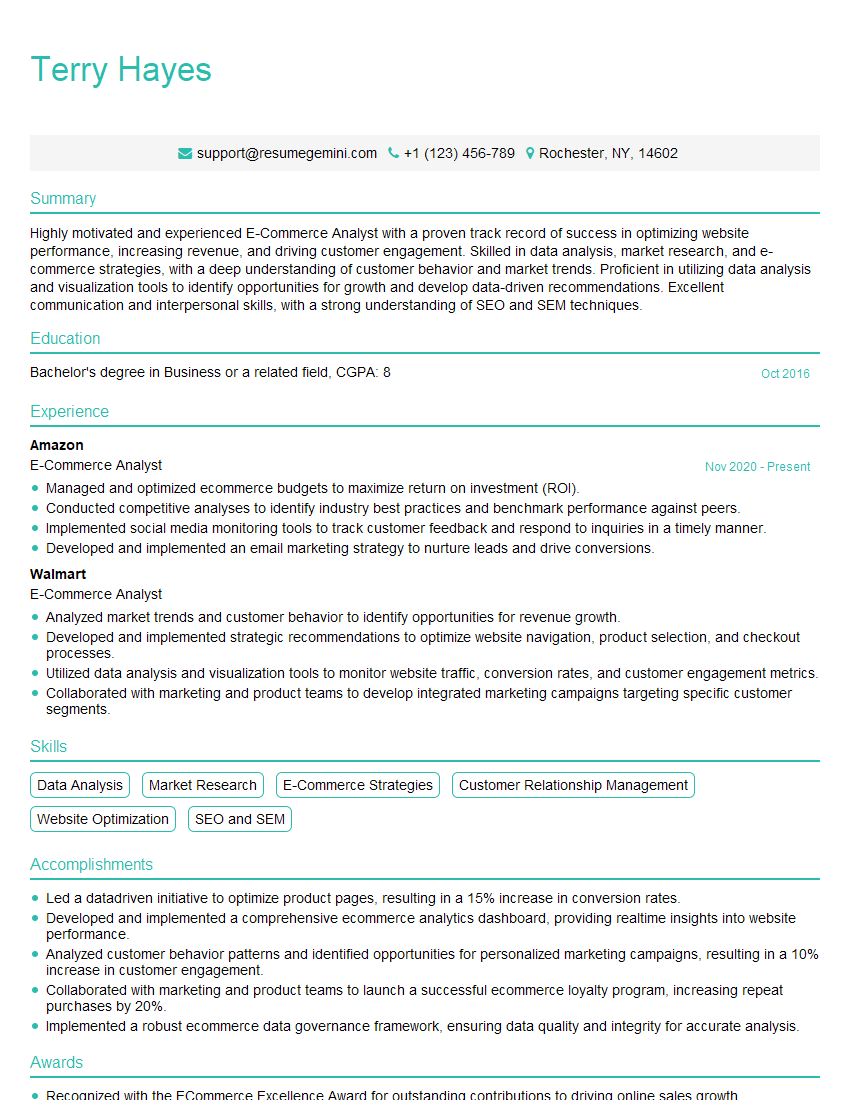Are you a seasoned E-Commerce Analyst seeking a new career path? Discover our professionally built E-Commerce Analyst Resume Template. This time-saving tool provides a solid foundation for your job search. Simply click “Edit Resume” to customize it with your unique experiences and achievements. Customize fonts and colors to match your personal style and increase your chances of landing your dream job. Explore more Resume Templates for additional options.

Terry Hayes
E-Commerce Analyst
Summary
Highly motivated and experienced E-Commerce Analyst with a proven track record of success in optimizing website performance, increasing revenue, and driving customer engagement. Skilled in data analysis, market research, and e-commerce strategies, with a deep understanding of customer behavior and market trends. Proficient in utilizing data analysis and visualization tools to identify opportunities for growth and develop data-driven recommendations. Excellent communication and interpersonal skills, with a strong understanding of SEO and SEM techniques.
Education
Bachelor’s degree in Business or a related field
October 2016
Skills
- Data Analysis
- Market Research
- E-Commerce Strategies
- Customer Relationship Management
- Website Optimization
- SEO and SEM
Work Experience
E-Commerce Analyst
- Managed and optimized ecommerce budgets to maximize return on investment (ROI).
- Conducted competitive analyses to identify industry best practices and benchmark performance against peers.
- Implemented social media monitoring tools to track customer feedback and respond to inquiries in a timely manner.
- Developed and implemented an email marketing strategy to nurture leads and drive conversions.
E-Commerce Analyst
- Analyzed market trends and customer behavior to identify opportunities for revenue growth.
- Developed and implemented strategic recommendations to optimize website navigation, product selection, and checkout processes.
- Utilized data analysis and visualization tools to monitor website traffic, conversion rates, and customer engagement metrics.
- Collaborated with marketing and product teams to develop integrated marketing campaigns targeting specific customer segments.
Accomplishments
- Led a datadriven initiative to optimize product pages, resulting in a 15% increase in conversion rates.
- Developed and implemented a comprehensive ecommerce analytics dashboard, providing realtime insights into website performance.
- Analyzed customer behavior patterns and identified opportunities for personalized marketing campaigns, resulting in a 10% increase in customer engagement.
- Collaborated with marketing and product teams to launch a successful ecommerce loyalty program, increasing repeat purchases by 20%.
- Implemented a robust ecommerce data governance framework, ensuring data quality and integrity for accurate analysis.
Awards
- Recognized with the ECommerce Excellence Award for outstanding contributions to driving online sales growth.
- Recipient of the Digital Commerce Award for innovation in ecommerce analytics and reporting.
- Honored with the ECommerce Analytics MVP Award for exceptional performance in data analysis and interpretation.
- Received the ECommerce Data Science Award for groundbreaking work in predictive analytics and machine learning.
Certificates
- Google Analytics Individual Qualification
- Google AdWords Certification
- Shoptimize Certified E-Commerce Analyst
- Certified Digital Marketing Professional (CDMP)
Career Expert Tips:
- Select the ideal resume template to showcase your professional experience effectively.
- Master the art of resume writing to highlight your unique qualifications and achievements.
- Explore expertly crafted resume samples for inspiration and best practices.
- Build your best resume for free this new year with ResumeGemini. Enjoy exclusive discounts on ATS optimized resume templates.
How To Write Resume For E-Commerce Analyst
- Highlight your technical skills in data analysis, market research, and e-commerce strategies.
- Showcase your experience in developing and implementing data-driven recommendations to optimize website performance.
- Emphasize your understanding of customer behavior and market trends, and your ability to identify opportunities for growth.
- Quantify your accomplishments with specific metrics, such as increased revenue, improved conversion rates, or reduced customer churn.
Essential Experience Highlights for a Strong E-Commerce Analyst Resume
- Analyzed market trends and customer behavior to identify opportunities for revenue growth.
- Developed and implemented strategic recommendations to optimize website navigation, product selection, and checkout processes.
- Utilized data analysis and visualization tools to monitor website traffic, conversion rates, and customer engagement metrics.
- Collaborated with marketing and product teams to develop integrated marketing campaigns targeting specific customer segments.
- Managed and optimized e-commerce budgets to maximize return on investment (ROI).
- Conducted competitive analyses to identify industry best practices and benchmark performance against peers.
- Implemented social media monitoring tools to track customer feedback and respond to inquiries in a timely manner.
Frequently Asked Questions (FAQ’s) For E-Commerce Analyst
What are the key responsibilities of an E-Commerce Analyst?
E-Commerce Analysts are responsible for analyzing market trends and customer behavior to identify opportunities for revenue growth. They develop and implement strategic recommendations to optimize website performance, increase conversion rates, and drive customer engagement. They also collaborate with marketing and product teams to develop integrated marketing campaigns targeting specific customer segments.
What are the qualifications required to become an E-Commerce Analyst?
E-Commerce Analysts typically have a bachelor’s degree in Business or a related field, with a strong understanding of data analysis, market research, and e-commerce strategies. They should also be proficient in utilizing data analysis and visualization tools.
What are the career prospects for an E-Commerce Analyst?
E-Commerce Analysts have excellent career prospects, as the e-commerce industry is rapidly growing. They can advance to roles such as E-Commerce Manager, Digital Marketing Manager, or Product Manager.
What are the challenges faced by E-Commerce Analysts?
E-Commerce Analysts face several challenges, such as the need to stay up-to-date with the latest e-commerce trends and technologies, the need to analyze large amounts of data, and the need to develop effective strategies to optimize website performance.
What are the key skills required for an E-Commerce Analyst?
E-Commerce Analysts should have strong analytical skills, market research skills, e-commerce strategies skills, customer relationship management skills, website optimization skills, SEO and SEM skills, and communication skills.